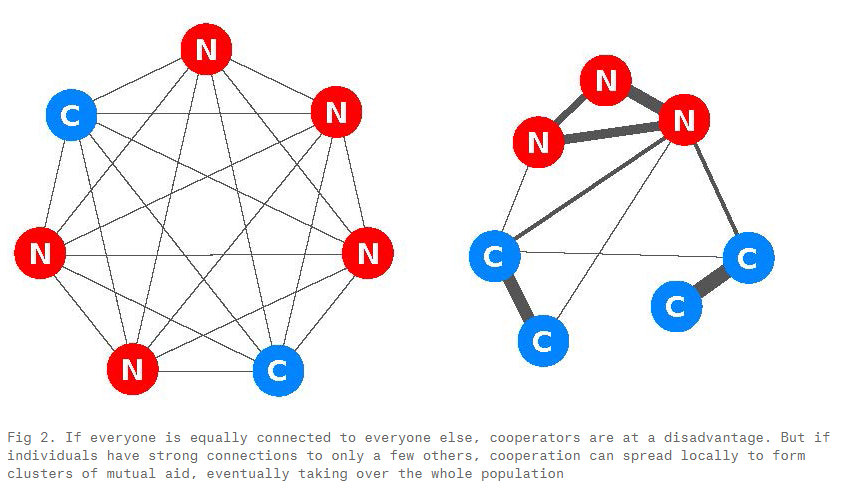UNLOCKING SIGNIFICANT SOCIAL EFFECT
NewsFlash
Planning decisions in Victoria require the decision maker to consider whether the proposed use or development may have any significant social effect (‘SSE’). This requirement is often overlooked, and successful reliance upon it is very rare, given the difficulties in demonstrating a negative SSE sufficiently to impact decision making. However, the SSE has potential to be utilised in a robust and rigorous way to achieve positive planning outcomes. SSE assessment presents an opportunity for communities to actively cooperate to improve the society in which they live. This idea has been recently considered by mathematicians in the context of how large scale changes in social behaviour can be effected by local communities[1]. The mathematical model shows how improved cooperation arises where an institution encourages fewer but stronger connections[2]. An extract of this model is below. “N” is non-cooperation and “C” cooperation. This model is helpful to planning practice as a direction to optimise best methods for achieving positive social effects. Communities can improve planning decisions by focusing on a more cooperative environment that fosters fewer but stronger ties. It could provide a model of cooperation that readily includes permit applicant/developer/owner, Responsible Authority and community.
Hubert Algie
22 September 2017
[1] Eg giving to charity or responding to climate change
[2] Benjamin Allen, ‘Global cooperation depends on the strength of local connections’, 5 September 2017 <https://aeon.co/ideas/global-cooperation-depends-on-the-strength-of-local-connections> citing Benjamin Allen, Gabor Lippner, Yu-Ting Chen, Babak Fotouhi, Nagmeh Momeni, Shing-Tung Yau and Martin A Nowak, ‘Evolutionary dynamics on any population structure’ (2017) 544 Nature 227.
Copyright © Kellehers Australia 2017
Liability limited by a scheme approved under Professional Standards Legislation
This fact sheet is intended only to provide a summary and general overview on matters of interest. It does not constitute legal advice. You should always seek legal and other professional advice which takes account of your individual circumstances.
This model is helpful to planning practice as a direction to optimise best methods for achieving positive social effects. Communities can improve planning decisions by focusing on a more cooperative environment that fosters fewer but stronger ties. It could provide a model of cooperation that readily includes permit applicant/developer/owner, Responsible Authority and community.
Hubert Algie
22 September 2017
[1] Eg giving to charity or responding to climate change
[2] Benjamin Allen, ‘Global cooperation depends on the strength of local connections’, 5 September 2017 <https://aeon.co/ideas/global-cooperation-depends-on-the-strength-of-local-connections> citing Benjamin Allen, Gabor Lippner, Yu-Ting Chen, Babak Fotouhi, Nagmeh Momeni, Shing-Tung Yau and Martin A Nowak, ‘Evolutionary dynamics on any population structure’ (2017) 544 Nature 227.
Copyright © Kellehers Australia 2017
Liability limited by a scheme approved under Professional Standards Legislation
This fact sheet is intended only to provide a summary and general overview on matters of interest. It does not constitute legal advice. You should always seek legal and other professional advice which takes account of your individual circumstances.
Leave a Reply